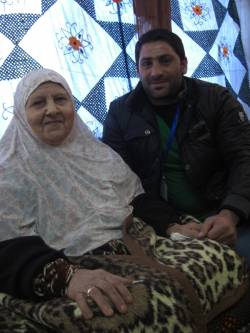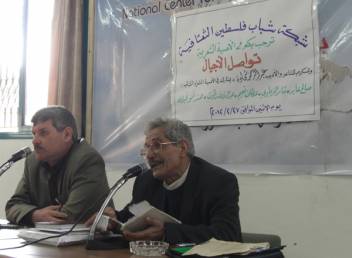 I spent the last part of my trip to Palestine in Gaza. Crossing from Israel to the Gaza strip is a bizarre experience – like travelling between two different worlds connected at Erez by a long tunnel through no man’s land.
I spent the last part of my trip to Palestine in Gaza. Crossing from Israel to the Gaza strip is a bizarre experience – like travelling between two different worlds connected at Erez by a long tunnel through no man’s land.
The roads stop being smooth and there’s rubble on the side of the streets. People are visibly poorer. But they are also open, warm and generous. Although life in Gaza is tough due to the effects of the war and subsequent blockade, it still feels like a busy, bustling place on the Mediterranean Sea.
Working in Shatee refugee camp
I was lucky enough to go there to visit the HelpAge office in Gaza City, as well as the older people we are supporting there. With our Affiliate El Wedad, we are helping older people in Shatee refugee camp (meaning “beach camp” – although this is definitely misleading) who have psychosocial and physical problems.
Although called a camp, it’s not what you would imagine a refugee camp to be; made out of tents isolated, etc… The refugees in Gaza have been in camps for too long, some since 1948. As a result, the camp is made up of make shift houses, small alleys and there is a busy market running down the main street.
As you can imagine though, living in uncertain, cramped conditions under the threat of conflict for decades can have a devastating effect on someone’s mental and physical health. Hakma, for example, is 73 and lives alone. She has cataracts and one of her legs was amputated due to diabetes. Before she became part of our psychosocial programme with our Affiliate El Wedad in April 2010, she hadn’t left the house in two years.
“My house felt like a prison”
She said: “I don’t complain about my health problems. The main thing is to see people and be able to leave the house. My house felt like a prison before. I felt really sad that I didn’t see anyone. Now I’m happy.”
Mohammed from El Wedad visits Hakma twice a week and has helped by providing her with individual counselling, as well as involving her family to re-establish connections with them. Now her daughter and grandson visit her and help her by cleaning and cooking.
She also went on a recreational trip as part of our programme funded by the Spanish Government (AECID). She said: “Thank you and thank God for the trip. We ate lunch and had fruit. I was really happy and it really broke the isolation. The only contact I had before was the radio.”
One of the highlights of my visit was seeing the amazing relationships HelpAge and our partner’s staff have built with the older people they help – it is obvious how close Hakma and Mohamed have become. The older people we support here are vulnerable; to depression, isolation and chronic diseases. However, with some help, they are more confident and happy.
Meeting a respected leader
 Another great moment from my time in Gaza was meeting our Age Demands Action leader, poet, writer, teacher and Palestinian celebrity Mr Shehada.
Another great moment from my time in Gaza was meeting our Age Demands Action leader, poet, writer, teacher and Palestinian celebrity Mr Shehada.
Dr Sonja, our Country Director, Osama, our Gaza Programme Manager and I were invited to the National Center for Studies and Documentation where he was receiving an award for his time teaching there.
The event was full of students graduating from the centre, journalists, fellow writers and poets…and us! There were at least 60-70 people in the room and you could feel their respect for Mr Shehada as he spoke about his life and read some of his poems.
One of the professors at the centre thanked Mr Shehada, saying that he was more active than the young students there. Then Mr Shehada gave some advice to all those graduating: “Don’t give up, even if you fail or are rejected!”
World Health Day
We were also able to chat about our plans for Age Demands Action on Health, which coincides with World Health Day on 7 April – the theme this year being ageing.
He said he is happy to be involved and that we should involve everyone, religious leaders, students, ministers, students, professors. Ideally, he said, he wants to have a statement from the UN reiterating older people’s right to health.
He finished by saying: “We need to show the real problem, the real situation. Older people have nothing, but they are not ‘nothing’, they are more than just vulnerable people.”
I couldn’t have put it better myself!
Read more about our work with older people in the occupied Palestinian territory
